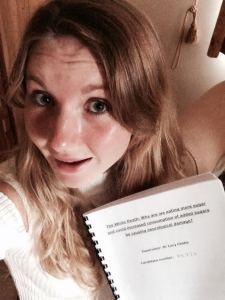 I studied Natural Sciences at Murray Edwards College, specialising in Neuroscience in my final year. I had been interested in Neuroscience ever since completing my Extended Project in high school. In my project I looked into the debate about whether adolescent behaviour was more influenced by genetics or by the environment. Although honestly I was just searching for an excuse to be a moody teenager and not be blamed for it! After my initial interest was sparked I became more and more interested in Neuroscience. I find this subject fascinating as I find studying Neuroscience a way of trying to understand how humans work at the most fundamental level.
I studied Natural Sciences at Murray Edwards College, specialising in Neuroscience in my final year. I had been interested in Neuroscience ever since completing my Extended Project in high school. In my project I looked into the debate about whether adolescent behaviour was more influenced by genetics or by the environment. Although honestly I was just searching for an excuse to be a moody teenager and not be blamed for it! After my initial interest was sparked I became more and more interested in Neuroscience. I find this subject fascinating as I find studying Neuroscience a way of trying to understand how humans work at the most fundamental level.
I particularly enjoyed studying a modular course at Cambridge as it allowed me to study the aspects of my subject I find most interesting, I particularly enjoyed the fact I was able to take modules on neural networks as well as a psychology module on memory.
My studies never ceased to fascinate me and made me realise just how amazing our brain and by extension we as humans are. There was a continual realisation of how seemingly simple processes are actually much more complex than they appear on the surface. For example, vision seems fairly straightforward, but you can find people who are ‘blind’ but can still tell you where objects are or how they are orientated, even though they cannot ‘see’ them. Or that memories are not fixed and immutable and can be updated or altered. Even that we have different types of memories! All of this I found fascinating and it made me appreciate my brain and my body so much more when I could understand a slightly larger proportion of what it was doing for me on a daily basis.
This in part is why I would encourage young women today to pursue science as a subject; the ability to understand more about the world around you or yourself can only lead to a greater appreciation of how wondrous these things truly are.
Megan Hutchings
Alumna